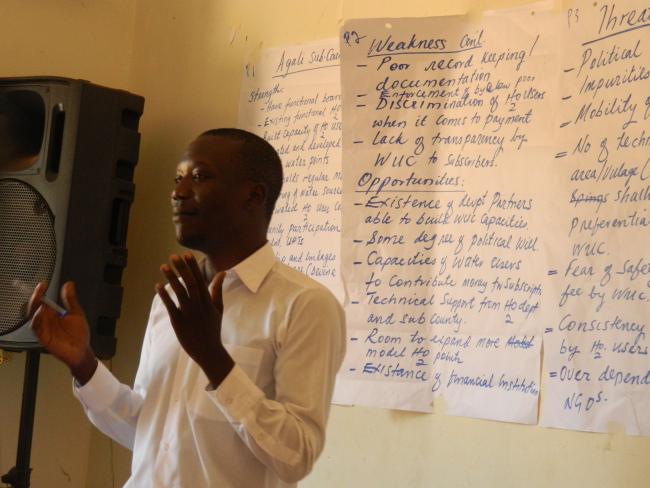Intern Jimmy Otim realised his passion for WASH in Uganda's Lira District.
Published on: 04/07/2016

Jimmy Otim is the Assistant District Water Officer Lira District. He joined the office in 2011, as an engineering intern. When he joined, IRC and partners were implementing the Triple-S Initiative in the district, experimenting with new approaches to improve functionality and sustainability of rural water supply facilities.
Being an intern eager to learn, Jimmy immediately took keen interest in the activities of Triple-S. The District Water Officer, Engineer Hudson Omoko gave Jimmy all the space he needed to learn and grow in the sector. Five years down the road, Jimmy has been confirmed in the district service and has learnt more than he ever expected to learn – thanks to IRC/Triple-S. Most of all, he has observed great improvement in both coverage and functionality of rural water services in Lira over the five years. Safe water coverage improved from 73% in 2011 to 90% in 2015. Functionality of water supply facilities increased from 74% in 2011 to 80% in 2015. Jimmy believes that IRC has been influential in creating and fostering the remarkable changes in the district WASH sector. He explains the key factors leading to the improvement:
Effective coordination: Before 2010 Lira district was recovering from a protracted insurgency, characterised by the armed conflict between the Government of Uganda and the Lord's Resistance Army (LRA). During that period, there were many actors, but limited coordination. Most actors undertook interventions without supervision. The district authorities were not tracking trends effectively. When peace returned, UNICEF and UNOCHA closed their Lira offices, leaving a coordination gap. Then IRC and partners came in with the Triple-S Initiative and rejuvenated district WASH coordination at district and sub county level. They supported extension staff to take learning visits to Amuria and Arua districts where coordination was being done effectively. These opened the minds of Lira district WASH actors and they started re-strategising and putting resources where they were most needed. The result is improvement in services.
Political support: The district political leadership was very supportive to IRC and other actors who came in to help the district transition from the humanitarian to the development phase. The Chief Administrative Officer was always supportive of WASH issues and personally chaired the coordination meetings. The chairperson of the works and technical committee was also always in attendance. Their participation added value. Added to the political support was the commitment of technical staff especially in the District Water Office to ensure quality and efficiency.
Innovations: IRC came in with wide range of innovations geared towards good service delivery for WASH. The interventions addressed the gaps in the district WASH sector. The new approaches were: District WASH coordination, Hand Pump Mechanics Associations (HPMA), the learning approach, Mobile Phones for Water (M4W) for information sharing, and the sub county water board model. Some issues have not yet been completely resolved but there are ongoing efforts. The District still experiences challenges like:
At the time of joining, as a young man fresh from college, Jimmy was eager to learn and to excel. That kept him proactive. His eagerness to learn met with the Triple-S approach of action research and learning. That gave him an opportunity to be part of all the positive developments in the district WASH sector. "It is very embarrassing if a project comes and dies while you are looking on. It demoralises the initiators and chases others away. I was therefore keen to be part of the successful implementation of the Triple-S experiments. In the long run, I learnt a lot," Jimmy says. He adds, "Over the years I have improved my knowledge and skills. I have interacted with different people and this has kept me going. But most importantly, services in the district have improved and Lira district has become a point of reference."
You can see Jimmy in action in The Triple S Uganda story video below (segment 3:18-3:50 minutes).
For more information on IRC's work in Lira district, see the Links below.
Key publications on Sub-county Water Supply and Sanitation Boards, Hand Pump Mechanics Associations (HPMAs), Mobile Phones for Water (M4W) and the learning approach are listed under Resources.